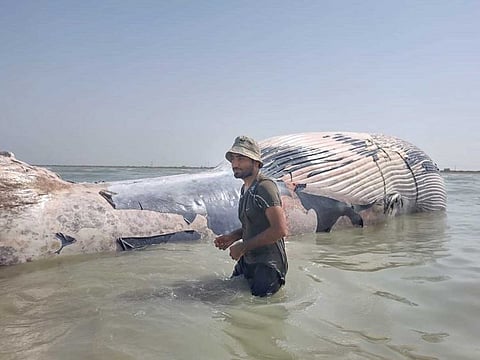Blue whale washes up dead on Gwadar beach in Pakistan
Gwadar authorities plan to preserve the remains of the dead whale

Islamabad: Fishermen in the town of Jiwani, Gwadar in Balochistan province, were surprised to see the lifeless body of a 36-foot blue whale on the beach.
They found the carcass on Friday morning and reported it to the wildlife authorities. It was identified as a blue whale, one of the three whale species found in Pakistani waters, alongside Bryde’s whale and Arabian humpback whale.
The cause of the mammal’s death remains unknown. Sudheer Ahmed, a World Wildlife Fund (WWF) Pakistan researcher in Jiwani, shared photos and videos of the dead whale and said that there were marks of injuries on the whale’s tails, called flukes. However, a detailed report will be provided once the veterinarians have examined the carcass of the blue whale to determine what killed the animal.
Mohammad Moazzam Khan, an aquatic life expert and technical advisor to WWF Pakistan, said the blue whale is the largest and oldest living animal on Earth. These magnificent marine mammals can grow to more than 100 feet long and weigh up to 200 tons, equivalent to approximately 33 elephants. With no official research conducted to estimate the blue whale population in Pakistan, experts believe there are fewer than a hundred in this region. Khan emphasised the urgent need for conservation due to its very small population in Pakistani waters.
Local experts have urged the government wildlife department to preserve the carcass of the blue whale for future research and studies. The Gwadar Development Authority has indicated that they plan to preserve the remains of the dead whale.
Blue whales are an endangered species, according to the International Union for Conservation of Nature. There are only about 10,000 to 25,000 blue whales left in the world today.
These marine mammals primarily feed on krill and pose no threat to humans. “Unfortunately, they are prone to getting entangled in the tuna-gill nets within the Exclusive Economic Zone of Pakistan or are hit by ships that ply the Indian Ocean,” according to a statement by WWF Pakistan. Blue whales are highly sensitive to underwater noise, which can disorient them, leading to beaching or propeller strikes. In an effort to mitigate such incidents, WWF Pakistan has been actively collaborating with local fishermen to promote responsible net deployment and training to safely disentangle non-target species, including whales, dolphins, marine turtles, and whale sharks, reducing the risks faced by cetaceans in Pakistani waters.
In November 2019, a 31-foot-long Bryde’s whale was found dead and entangled in a fishing net on a remote rocky shore along the Balochistan coast.
Sign up for the Daily Briefing
Get the latest news and updates straight to your inbox



